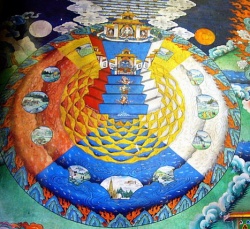Purvavideha
Purvavideha (Skt. Pūrvavideha; Tib. Lüpakpo; ལུས་འཕགས་པོ Wyl. lus 'phags po; Eng. 'Surpassing the Body') — one of the four continents situated to the East of Mount Meru. It is semi-circular in shape and white in colour, and flanked by the two subcontinents of Deha (Skt.; Tib. Lü; Wyl. lus) and Videha (Skt.; Tib. Lüpak; Wyl. lus 'phags). Human beings who live there are twice as tall as us and have semi-circular faces; peaceful and vegetarian, they enjoy long and pleasurable lives (250 years) but devoid of any true Dharma. The principal attribute of this continent is its jewel mountain made of diamonds, lapis lazuli, sapphires, emeralds, pearls, gold, silver and crystal
Source
Pūrvavideha or Pubbavideha is located in the east, and is shaped like a semicircle with the flat side pointing westward (i.e., towards Sumeru). It is 7,000 yojanas in extent (Vibhajyavāda tradition) or has a perimeter of 6,350 yojanas of which the flat side is 2,000 yojanas long (Sarvāstivāda tradition). Its tree is the acacia. The people here are about 12 feet (3.7 m) tall and they live for 250 years.
Source
弗婆提・勝身洲 (Skt; Jpn Hotsubadai or Shoshin-shu)
One of the four continents of the world, according to the ancient Indian worldview. Purvavideha is located to the east of Mount Sumeru in the outermost of the eight concentric seas surrounding the mountain, which is at the center of the world. Within Purvavideha, there are two large states, Deha and Videha, and five hundred smaller states. Purvavideha is said to be in the shape of a semicircle.
See also
Source
Comment: In Buddhist cosmology there are four large continents, each of which has two smaller continents (gling phran brgyad) next to it: In the center, is the monarch of mountains, ri rab (meru).
The four continents and eight smaller continents are
(1) shar lus 'phags po (videha), the eastern continent land of [those with] superior/large bodies with lus (deha) and lus 'phags (videha); (2) lho 'dzam bu gling (jambudvīpa), the southern continent Jambu-tree land with rnga yab (cāmara) and rnga yab gzhan (aparacāmara); (3) nub ba blang spyod (godanīya) the western continent land of using cattle with g.yo ldan (sāthā) and lam mchog 'gro (uttaramantriṇa); (4) byang sgra mi snyan (kuru), the northern continent land of unpleasant sound with sgra mi snyan (kurava) and sgra mi snyan kyi zla (kaurava).
Surrounding all of these is an outer rim of iron mountains.
Source
Superior Body, Videha; Noble Body Purva Videha (eastern continent); Videha; great body [the eastern continent)
The Rose-apple continent is an ancient name for the Indian sub-continent. Classical Buddhist cosmology regarded the world as arranged in four continents around Mt. Suneru. On the south was the Rose-apple continent; on the west, the Deathless Ox-cart continent; on the north, the Northern Kuru continent; and on the east, the Eastern Videha continent.
[2795] གླིང་བཞིའི་ནང་གསེས་ཤིག་སྟེ་རི་རབ་ཤར་ངོས་ཀྱི་རྒྱ་མཚོར་ཡོད་པའི་གླིང་ཆེན། གླིང་དེ་གཞན་བས་ཤིང་ཏཱ་ལ་བདུན་སྲིད་ཀྱིས་འཕགས་པའམ་དེར་སྐྱེ་བའི་མི་རྣམས་ལུས་ཆེ་བས་མིང་དེ་ལྟར་བཏགས་པ་ཡིན་ཞེས་བཤད། ...
